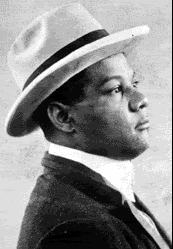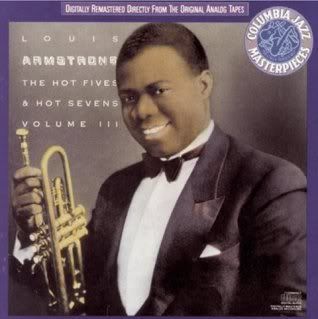In the 1920's, stride piano attempted to break away from the stultifying nature of ragtime and was very much to the fore during the Harlem Renaissance scene. One of the biggest hits of the period was "The Charleston", written by stride pianist James P Johnson. Stride piano employed a very "busy" style of play, using a left hand that was required to emulate bass and percussion. Hines was one of the first to break away from this by incorporating more complex accents and beats. He was pretty much doing on the piano what Louis Armstrong was doing with the trumpet in the mid 20's.
The two met in the Musicians Union Hall in Chicago in 1926 and they immediately recognised each others talents. Hines was to replace Lil Hardin Armstrong in the Hot Five and in 1928 they made recording musical history when they recorded "West End Blues". Other numbers recorded at that time included "Beau Koo Jack", "Muggles" and "Tight Like That", pretty much setting the standard for aspiring jazz musicians of the time and beyond. The song "Weather Bird" is a must listen-to. With free wheeling, innovative improvisation and the highest musicianship this is one of the most important musical cuts of the early 20th century in my opinion.
Hines held court in the Grand Terrace Cafe in Chicago well into the late 1930's. One of the proprietors of this establishment was none other than Al Capone whose career advice to Hines was "be like the 3 monkeys: you hear nothing, see nothing and say nothing". It was from here that he made his coast to coast radio broadcasts hitting the ears of Nat King Cole and Art Tatum.
A consummate professional (hence the nickname), he was also unafraid to push himself musically. His song "Cavernism" predates the height of the Swing Era by a couple of years although it sounds decidedly post-Goodman. He also gave Charlie Parker his first professional break and worked with Dizzy Gillespie in the early bebop years (unfortunately unrecorded).
He enjoyed something of a purple patch late in his career. He recorded well over 100 albums in the 60's and 70's including some highly acclaimed solo recordings. New Yorker magazine dubbed him "a whole orchestra by himself".
To finish up check out Hines playing with one of my favourite artists and guitarists, Ry Cooder, performing the superb "Ditty Wah Ditty" from Cooder's solo album Paradise and Lunch.

